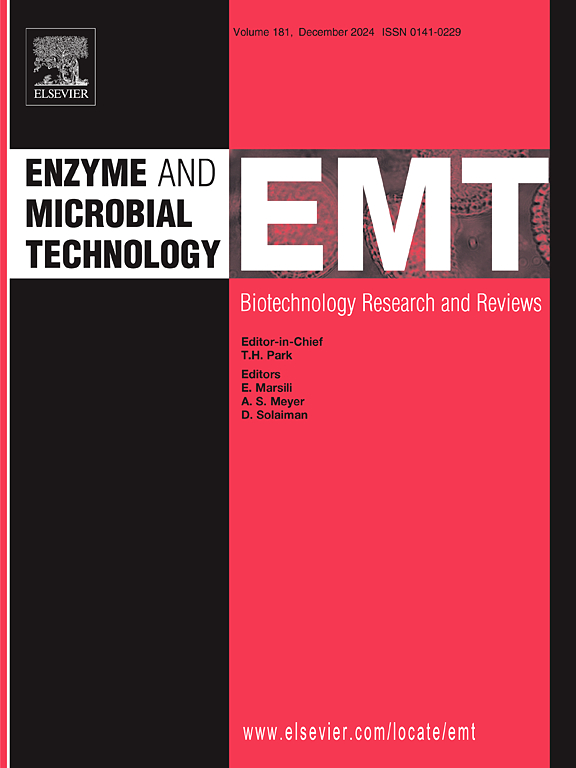Characterization of lycopene β-cyclase from Dunaliella bardawil for enhanced β-carotene production and salt tolerance
IF 3.7
3区 生物学
Q2 BIOTECHNOLOGY & APPLIED MICROBIOLOGY
引用次数: 0
Abstract
Dunaliella can accumulate more β-carotene (10 % or even more of the dry weight of cells) than any other species. Lycopene β-cyclase (LcyB) is the key enzyme in the catalysis of lycopene to β-carotene. In the present research, we used Escherichia coli BL21 (DE3) as host to construct two different types of engineering bacteria, one expressing the D. bardawil LcyB and the other expressing the orthologue Erwinia uredovora crtY. The catalytic ability of LcyB and CrtY were evaluated by comparing the β-carotene yields of the two E. coli BL21(DE3) strains, whose salt tolerance was simultaneously compared by cultivated them under different NaCl concentrations (1 %, 2 %, and 4 %). We also interfered with the LcyB gene to investigate the effect of LcyB in D. bardawil. Results displayed that the β-carotene yield of the LcyB-transformant significantly increased by about 48 % compared with the crtY-transformant. Additionally, LcyB was verified to be able to enhance the salt tolerance of E. coli BL21 (DE3). It is concluded that D. bardawil LcyB not only has better catalytic ability but also is able to confer salt tolerance to cells. Interfering D. bardawil LcyB induced the low expression of LcyB and the changes of growth and carotenoids metabolism in D. bardawil.
巴达维杜莎藻番茄红素β-环化酶的表征,以提高β-胡萝卜素产量和耐盐性。
杜纳利藻积累的 β-胡萝卜素(占细胞干重的 10%,甚至更高)比任何其他物种都多。番茄红素β-环化酶(LcyB)是将番茄红素催化成β-胡萝卜素的关键酶。在本研究中,我们以大肠杆菌 BL21 (DE3) 为宿主,构建了两种不同类型的工程菌,一种表达 D. bardawil LcyB,另一种表达 Erwinia uredovora crtY 的直向同源物。通过比较两株大肠杆菌 BL21(DE3)的β-胡萝卜素产量,评估了 LcyB 和 CrtY 的催化能力。我们还干扰了 LcyB 基因,以研究 LcyB 对 D. bardawil 的影响。结果显示,与 crtY 转化株相比,LcyB 转化株的β-胡萝卜素产量显著增加了约 48%。此外,还验证了 LcyB 能够增强大肠杆菌 BL21 (DE3) 的耐盐性。结论是,D. bardawil LcyB 不仅具有更好的催化能力,还能赋予细胞耐盐性。干扰 D. bardawil LcyB 会导致 LcyB 的低表达以及 D. bardawil 生长和类胡萝卜素代谢的变化。
本文章由计算机程序翻译,如有差异,请以英文原文为准。
求助全文
约1分钟内获得全文
求助全文
来源期刊

Enzyme and Microbial Technology
生物-生物工程与应用微生物
CiteScore
7.60
自引率
5.90%
发文量
142
审稿时长
38 days
期刊介绍:
Enzyme and Microbial Technology is an international, peer-reviewed journal publishing original research and reviews, of biotechnological significance and novelty, on basic and applied aspects of the science and technology of processes involving the use of enzymes, micro-organisms, animal cells and plant cells.
We especially encourage submissions on:
Biocatalysis and the use of Directed Evolution in Synthetic Biology and Biotechnology
Biotechnological Production of New Bioactive Molecules, Biomaterials, Biopharmaceuticals, and Biofuels
New Imaging Techniques and Biosensors, especially as applicable to Healthcare and Systems Biology
New Biotechnological Approaches in Genomics, Proteomics and Metabolomics
Metabolic Engineering, Biomolecular Engineering and Nanobiotechnology
Manuscripts which report isolation, purification, immobilization or utilization of organisms or enzymes which are already well-described in the literature are not suitable for publication in EMT, unless their primary purpose is to report significant new findings or approaches which are of broad biotechnological importance. Similarly, manuscripts which report optimization studies on well-established processes are inappropriate. EMT does not accept papers dealing with mathematical modeling unless they report significant, new experimental data.
 求助内容:
求助内容: 应助结果提醒方式:
应助结果提醒方式:


